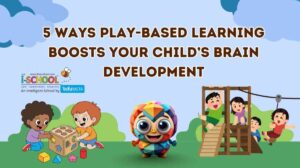5 Ways Play Based Learning Boosts Your Child’s Brain Development


Every parent wants to give their child the strongest start in life. In an age where early education often feels rushed or overly structured, it is easy to forget one simple truth. Children learn best when they play.
Play is not just fun. It is a powerful learning tool that shapes the brain, builds essential skills and encourages natural curiosity. Research from child development experts consistently shows that children who learn through play develop stronger thinking abilities, healthier emotional patterns and deeper learning habits.
Here are the five most meaningful ways play based learning supports a child’s growing brain.
1. Play strengthens brain development and cognitive growth
The moment a child starts exploring, building, sorting or imagining something new, their brain becomes highly active. During play, millions of neural connections form and strengthen. These connections support memory, problem solving, decision making and deeper understanding.
A child who stacks blocks is improving spatial awareness.
A child who arranges objects is learning logic and categorisation.
A child who imagines a story is building complex thinking skills.
2. Play encourages stronger communication and language skills
Children naturally speak more when they play. They describe what they are doing, ask questions, create characters, express ideas and talk through their thoughts. Even simple pretend play helps children build vocabulary, sentence formation, storytelling abilities and social communication.
For example, when a child pretends to be a doctor or shopkeeper, they use words and expressions that they may not use in daily routine. This helps them understand new concepts and speak with more confidence.
3. Play builds emotional intelligence and resilience
Children experience a wide range of emotions while playing. They feel excited when an idea works, frustrated when something falls apart and proud when they finish something on their own. These small but important emotional moments build self regulation and emotional awareness.
Through play, children learn how to express feelings safely, understand the emotions of others, handle disappointment, negotiate and take turns. These emotional skills shape stronger mental health and social confidence in the long run.
For a deeper understanding of emotional development, you may like our blog on social emotional learning for young children at https://theischool.com/blog/supporting-emotional-growth-in-young-children-the-edumeta-approach-to-social-emotional-learning/
4. Play improves motor skills that prepare children for writing and independence
Play encourages movement. Movement supports brain development. When children use their hands to draw, mould, thread, paint or build, they strengthen the small muscles needed for writing and daily tasks. These fine motor activities also improve concentration and hand eye coordination.
Large movements are equally important. Running, climbing, balancing and jumping help children improve posture, strength and overall stability.
If you want more activities that build writing readiness, take a look at our blog on motor skill activities for preschoolers at https://theischool.com/blog/developing-fine-and-gross-motor-skills-in-preschoolers/
5. Play nurtures creativity and lifelong curiosity
The most powerful advantage of play is the mindset it builds. Play helps children explore without fear, imagine freely and try new ideas with confidence. Whether they are creating a story, designing something new or inventing a different way to solve a problem, children learn to think creatively and independently.
Children who learn through play often become more motivated, confident and eager to learn new things. This love for learning becomes the foundation for success in school and beyond.
You can also read our blog on why curiosity is the foundation of better learning at https://theischool.com/blog/encouraging-curiosity-in-your-child-easy-tips-for-parents/
Conclusion
Play based learning is one of the strongest ways to support early brain development. It builds thinking skills, language growth, emotional readiness, physical development and creativity. Most importantly, it helps children enjoy learning rather than fear it.
At THE i-SCHOOL, play is at the heart of every learning experience. Classrooms are designed to inspire exploration, confidence and imagination so that every child grows into a curious and capable learner.
If you wish to explore more about early childhood development, feel free to browse related articles on our blog section.
